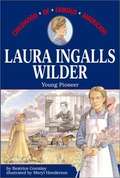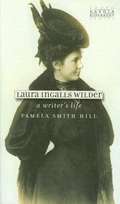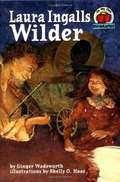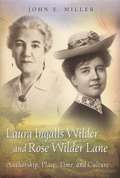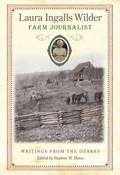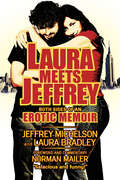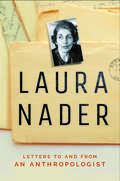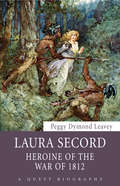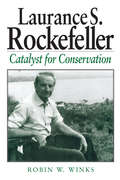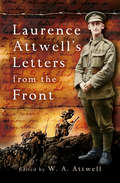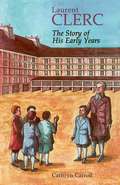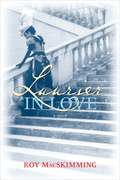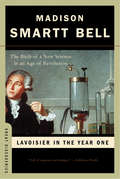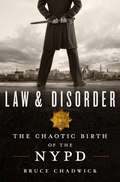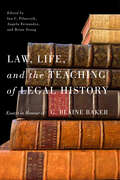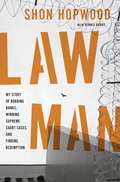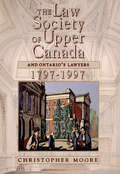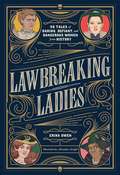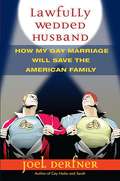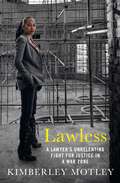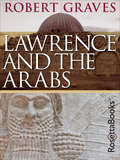- Table View
- List View
Laura Ingalls Wilder: Young Pioneer (Childhood of Famous Americans Series)
by Beatrice GormleyThis fictionalized biography of the author of the popular "Little House" books tells her family's real life on the American frontier, and of the events that surpassed the drama of her stories.
Laura Ingalls Wilder: A Writer's Life
by Pamela Smith Hill(abbreviated from back of book) Pamela Smith Hill delves into the complex and often fascinating relationships Wilder formed throughout her life that led to the writing of her classic Little House series. Using Wilder's stories. Hill has produced a historical-literary biography of the famous and much- loved author. Fol ... Hill provides a context, both familial and literary, for Wilder's writing career. (Hill studies).. the relationship with her daughter - the hidden editor - Rose Wilder Lane. Wilder produced her timeless classics with the help of her daughter's editorial insights. Hill argues that they differed in their visions of the path Wilder's career should follow, but eventually Lane's editing brought out the best of her mother's writing and allowed her creativity, expression, and experiences to shine through.
Laura Ingalls Wilder
by Ginger WadsworthExamines Laura Ingalls Wilder's life as a pioneer girl and her work as a writer describing that life for others.
Laura Ingalls Wilder and Rose Wilder Lane: Authorship, Place, Time, and Culture
by John E. Miller"The mother-daughter partnership that produced the Little House books has fascinated scholars and readers alike. Now, John E. Miller, one of America's leading authorities on Laura Ingalls Wilder and Rose Wilder Lane, combines analyses of both women to explore this collaborative process and shows how their books reflect the authors' distinctive views of place, time, and culture. Along the way, he addresses the two most controversial issues for Wilder/Lane aficionados: how much did Lane actually contribute to the writing of the Little House books, and what was Wilder's real attitude toward American Indians. Interpreting these writers in their larger historical and cultural contexts, Miller reconsiders their formidable artistic, political, and literary contributions to American cultural life in the 1930s. He looks at what was happening in 1932 - from depression conditions and politics to chain stores and celebrity culture - to shed light on Wilder's life, and he shows how actual "little houses" established ideas of home that resonated emotionally for both writers." "In considering each woman's ties to history, Miller compares Wilder with Frederick Jackson Turner as a frontier mythmaker and examines Lane's unpublished history of Missouri in the context of a contemporaneous project, Thomas Hart Benton's famous Jefferson City mural. He also looks at Wilder's Missouri Ruralist columns to assess her pre-Little House values and writing skills, and he readdresses her literary treatment of Native Americans. A final chapter shows how Wilder's and Lane's conservative political views found expression in their work, separating Lane's more libertarian bent from Wilder's focus on writing moralist children's fiction." "These nine thoughtful essays expand the critical discussion on Wilder and Lane beyond the Little House. Miller portrays them as impassioned and dedicated writers who were deeply involved in the historical changes and political challenges of their times - and contends that questions over the books' authorship do not do justice to either woman's creative investment in the series. Miller demystifies the aura of nostalgia that often prevents modern readers from seeing Wilder as a real-life woman, and he depicts Lane as a kindred artistic spirit, helping readers better understand mother and daughter as both women and authors."--BOOK JACKET.
Laura Ingalls Wilder, Farm Journalist: Writings from the Ozarks
by Laura Ingalls Wilder Steven W. Hines(front cover flap) Laura Ingalls Wilder WRITINGS FROM THE OZARKS Edited by Stephen W. Hines Before Laura Ingalls Wilder found fame with her Little House books, she made a name for herself with short nonfiction pieces in magazines and newspapers. Read today, these pieces offer insight into her development as a writer and depict farm life in the Ozarks- and also show us a different Laura Ingalls Wilder from the woman we have come to know. This volume collects essays by Wilder that originally appeared in the Missouri Ruralist between 1911 and 1924. Building on the initial compilation of these articles under the title Little House in the Ozarks, this revised edition marks a more comprehensive collection by adding forty-two additional Ruralist articles and restoring passages previously omitted from other articles.
Laura Ingalls Wilder's Little Town Where History and Literature Meet
by John MillerDe Smet, SD is where Laura Ingalls Wilder grew up and the setting of 5 of her books. Here is a history comparing the town in Laura's books to the real town. (front flap) As Laura Ingalls Wilder anticipated, her widely loved stories of her prairie childhood have become much more than a nostalgic blend of myth, memories, and autobiography. As John Miller reveals, they have much to tell us about the historical realities of day-to-day living and attitudes in the nineteenth century. History and literature are closely intertwined, Miller contends. Here he illustrates how Wilder's novels enhance our understanding of history and how, simultaneously, a historical perspective framed Wilder's fiction. He shows how Wilder interwove content and form to produce a sentimental and compelling yet nuanced and believable picture of family life on the agricultural frontier.
Laura Meets Jeffrey
by Laura Bradley Jeffrey Michelson"There is no such thing as great sex unless you have an apocalyptic moment." * "The difference between writing and literature is agreeable style and irony. This book has both." * "Objective, funny, salacious and perversely-dare I say it- uplifting!" NORMAN MAILER "Undeniably brilliant." LEGS McNEIL "Swimming in audacity." DWAYNE RAYMOND LAURA MEETS JEFFREY is a love story, a name-dropping, hilarious, shameless erotic cyclone, a documentary of the excesses, dangers and extreme edges of sex, drugs, rock 'n' roll, and a close-up personal history of sexual liberation's primetime. LAURA MEETS JEFFREY while she's working in an upscale New York City brothel in 1980 and they share an apocalyptic moment. It's love at first orgasm. And so begins their double lives. At dinner parties she's known as a witty lingerie model and jewelry artisan, and a famous film director's ex-lover. He's her media wizard boyfriend, a designer discovered by John Lennon who worked for John & Yoko, Apple Records and the Rolling Stones, and then created Puritan, the world's largest-selling explicit sex magazine. On weekends he boxes with Ryan O'Neal and Jose Torres. In their bedroom, many other rooms, rooftops, hotel elevators and the New York, LA and Miami demimonde of call girls, coke dealers, BDSM, on-premise sex clubs, adult bookstore glory holes, orgies, porn stars, Jerzy Kosinski, Al Goldstein and a horny White House speechwriter or two, Laura and Jeffrey transform into unquenchable libidomaniacs. Norman Mailer considered his famous interview with Jeffrey and Laura on "Ethics and Pornography," excerpted as a bonus chapter in this book, one of the best of the more than 600 he gave in his lifetime. Mailer bequeathed the Foreword and gave guidance to this account of two lovers, who missed none of the wild era just before the door slammed shut on sexual freedom and aren't afraid to reveal all of it. Introduction by Legs McNeil.
Laura Nader: Letters to and from an Anthropologist
by Laura NaderLaura Nader documents decades of letters written, received, and archived by esteemed author and anthropologist Laura Nader. She revisits her correspondence with academic colleagues, lawyers, politicians, military officers, and many others, all with unique and insightful perspectives on a variety of social and political issues. She uses personal and professional correspondence as a way of examining complex issues and dialogues that might not be available by other means. By compiling these letters, Nader allows us to take an intimate look at how she interacts with people across multiple fields, disciplines, and outlooks.Arranged chronologically by decade, this book follows Nader from her early career and efforts to change patriarchal policies at UC, Berkeley, to her efforts to fight against climate change and minimize environmental degradation. The letters act as snapshots, giving us glimpses of the lives and issues that dominated culture at the time of their writing. Among the many issues that the correspondence in Laura Nader explores are how a man on death row sees things, how scientists are concerned about and approach their subject matter, and how an anthropologist ponders issues of American survival. The result is an intriguing and comprehensive history of energy, physics, law, anthropology, feminism and legal anthropology in the United States, as well as a reflection of a lifelong career in legal scholarship.
Laura Secord: Heroine of the War of 1812
by Peggy Dymond Leavey2013 Speaker’s Book Award — Shortlisted Laura Secord is now famous for her singular feat of bravery during the War of 1812, but did she warn the British and help defeat the American invaders as her legend says? After dragging her injured husband off the battlefield during the War of 1812, Laura Secord (1775-1868) was forced to house American soldiers for financial support while she nursed him back to health. It was during this time that she overheard the American plan to ambush British troops at Beaver Dams. Through an outstanding act of perseverance and courage in 1813, Laura walked an astonishing 30 kilometers from her home to a British outpost to warn Lieutenant James FitzGibbon. Despite facing rough terrain, the ever-present danger of being caught by American troops, and rather delicate encounters with Native forces, Laura reached FitzGibbon just in time for the British to prepare and execute an ambush on American military nearby, forcing the U.S. general to surrender. Laura lived a very long time, dying at the age of 93. In her lifetime the government never formally recognized her singular feat of bravery, and much controversy still envelopes her legacy.
Laurance S. Rockefeller: Catalyst For Conservation
by Robin W. Winks Bruce BabbittDespite his status as a scion of one of the wealthiest and most famous families in the United States and an enormously successful businessman in his own right, Laurance S. Rockefeller is unknown to all but a few Americans. Yet while he has been neither Vice President nor Governor nor chairman of the world's largest bank, his contribution to society has been at least as great as that of his more famous brothers. In Laurance S. Rockefeller: Catalyst for Conservation, noted historian Robin W. Winks brings Laurance to the forefront, offering an intimate look at his life and accomplishments. While Rockefeller has played a vital role in the business world as one of the most astute venture capitalists of our time--providing seed money for, among other endeavors, Eastern Airlines, Intel Corporation, and Apple Computers--his driving passion throughout his life has been the environment In addition to donating millions of dollars and the helping to found numerous conservation organizations, he served under five consecutive presidents in environmental advisory capacities. As chairman of the Outdoor Recreation Resources Review Commission (ORRRC) under Presidents Eisenhower and Kennedy, Rockefeller orchestrated an assessment of the recreation and conservation needs of the American people and the policies and programs required to meet those needs. The reports issued by the Commission are a groundbreaking achievement that laid the framework for nearly all significant environmental legislation of the following three decades. Winks uses a combination of historical insight and extensive research to present the first in-depth examination of Laurance Rockefeller's life and work. His book explores Rockefeller's role in the transition from traditional land conservation to a more inclusive environmentalism. It compels broader interpretation of the history of environmental protection, and is essential reading for anyone concerned with the past or future of conservation in America.
Laurence Attwell's Letters from the Front
by W. A. AttwellLawrence Attwell was one of the lucky ones, surviving over four years of trench warfare on the Western Front. During that time he had two short periods of leave.In his extraordinary series of letters to his family he graphically recounts what life was like for the ordinary infantry soldier on active duty. We learn of the conditions, the discipline, the courage, the fear and the reactions of the writer and his fellows. Attwell was in the Prince of Wales Own, Civil Service Rifles.
Lauren's World: My Life with Cerebral Palsy
by Lauren TrevarthenTake a trip with Lauren as she navigates through her life with Cerebral Palsy. You'll read how just eating a meal can be both satisfying and frustrating at the same time. Lauren hopes you can better understand what it's like living with a physical disability. You can contact me on my website www.queenlaurentrevarthen.com
Laurent Clerc: The Story of His Early Years
by Cathryn CarrollLaurent Clerc won lasting renown as the deaf teacher who helped Thomas Hopkins Gallaudet establish schools to educate deaf Americans in the 19th century. Now, his character as a young boy growing up in Paris has been captured in the novel Laurent Clerc. In his own voice, Clerc vividly relates the experiences that led to his later progressive teaching methods. Especially influential was his long stay at the Royal National Institute for the Deaf in Paris, where he encountered sharply distinct personalities -- the saintly, inspiring deaf teacher Massieu, the vicious Dr. Itard and his heartless "experiments" on deaf boys, and the "Father of the Deaf," Abbe Sicard, who could hardly sign. Young adult readers will find his story richly entertaining as well as informative.
Laurier in Love: A Novel
by Roy MacskimmingFrom the author of Macdonald, comes a new novel about an extraordinary love triangle set at the apex of Canada’s national life at the dawn of the twentieth century. A deeply absorbing novel of passion and politics, Laurier in Love reveals a side of Sir Wilfrid Laurier as Canadians have never known him: romantic and idealistic, inspiring and seductive, yet conflicted and compromised, as he balances his time between his wife and his mistress. Elegant, silver-tongued Sir Wilfrid Laurier is just beginning his fabled career as one of the nation’s greatest leaders. Some Canadians revile him simply because he is French-Canadian and Roman Catholic, the first Prime Minister from Quebec. Keenly aware of the difficulties lying ahead, Laurier tells his devoted wife, Zoë Laurier, how much he needs her. At the same time, he assures his ambitious, literary lover, Émilie Lavergne, that she too is indispensable to him. Through the eyes of these two fascinating women, we see Laurier the orator, charming Americans in Chicago; Laurier the statesman, starring at Queen Victoria’s diamond jubilee celebrations in London; Laurier the conciliator, walking the perilous line between demands of English and French as Canada fights her first foreign war in distant South Africa. The cast of characters includes the aging monarch, the doomed President McKinley, a young Winston Churchill, an even younger Mackenzie King. Both epic and intimate in scale, Laurier in Love gives readers the authentic sense of the man, the era, the politics and the complex personal life Laurier led behind the scenes.
Lavoisier in the Year One: The Birth of a New Science in an Age of Revolution (Great Discoveries)
by Madison Smartt Bell"Fresh . . . solid . . . full of suspense and intrigue."--Publishers Weekly Antoine Lavoisier reinvented chemistry, overthrowing the long-established principles of alchemy and inventing an entirely new terminology, one still in use by chemists. Madison Smartt Bell's enthralling narrative reads like a race to the finish line, as the very circumstances that enabled Lavoisier to secure his reputation as the father of modern chemistry--a considerable fortune and social connections with the likes of Benjamin Franklin--also caused his glory to be cut short by the French Revolution.
Law and Christianity: Pope Benedict XVI’s Legal Thought
by Cartabia, Marta and Simoncini, Andrea Marta Cartabia Andrea SimonciniThroughout Pope Emeritus Benedict XVI's pontificate he spoke to a range of political, civil, academic, and other cultural authorities. These speeches reveal a striking sensitivity to the fundamental problems of law, justice, and democracy. He often presented a call for Christians to address issues of public ethics such as life, death, and family from what they have in common with other fellow citizens: reason. This book discusses the speeches in which the Pope Emeritus reflected most explicitly on this issue, along with commentary from distinguished legal scholars. It responds to Benedict's invitation to engage in public discussion on the limits of positivist reason in the domain of law from his address to the Bundestag. Although the topics of each address vary, they are joined by a series of core ideas whereby Benedict sketches, unpacks, and develops an organic and coherent way to formulate a 'public teaching' on justice and law.
Law and Society in the Age of Theoderic the Great
by Sean D. W. LaffertyThis book explores the evolution of Roman law and society in Italy from 493, with the proclamation of the Ostrogoth Theoderic the Great as king, until about 554, when the eastern Emperor Justinian was able to re-establish imperial authority in the region. Drawing upon evidence from a variety of legal and historical sources, it investigates how Theoderic and his successors attempted to govern the peninsula in the wake of foreign invasions, the collapse of civic administration, the break-up of the Mediterranean economy, and the emergence of new forms of religious and secular authority. It challenges long-held assumptions as to just how peaceful, prosperous and Roman-like Theoderic's Italy really was. Its primary focus is the Edictum Theoderici, a significant but largely overlooked document that offers valuable historical insights into the complex and sometimes contested social, political and religious changes that marked Italy's passage from Antiquity into the Middle Ages.
Law & Disorder: The Chaotic Birth Of The Nypd
by Bruce ChadwickNineteenth-century New York City was one of the most magnificent cities in the world, but also one of the most deadly. Without any real law enforcement for almost 200 years, the city was a lawless place where the crime rate was triple what it is today and the murder rate was five or six times as high. The staggering amount of crime threatened to topple a city that was experiencing meteoric growth and striving to become one of the most spectacular in America. For the first time, award-winning historian Bruce Chadwick examines how rampant violence led to the founding of the first professional police force in New York City. Chadwick brings readers into the bloody and violent city, where race relations and an influx of immigrants boiled over into riots, street gangs roved through town with abandon, and thousands of bars, prostitutes, and gambling emporiums clogged the streets. The drive to establish law and order and protect the city involved some of New York’s biggest personalities, including mayor Fernando Wood, police chief Fred Tallmadge, and journalist Walt Whitman. Law and Disorder is a must read for fans of New York history and those interested in how the first police force, untrained and untested, battled to maintain law and order.
Law, Life, and the Teaching of Legal History: Essays in Honour of G. Blaine Baker
by Ian C. Pilarczyk, Angela Fernandez, and Brian YoungAs the leading legal historian of his generation in Canada and professor at McGill University for thirty-five years, Blaine Baker (1952–2018) was known for his unique personality, teaching style, intellectual cosmopolitanism, and deep commitment to the place of Canadian legal history in the curriculum of law faculties.Law, Life, and the Teaching of Legal History examines important themes in Canadian legal history through the prism of Baker’s career. Essays discuss Baker’s own research, his influence within McGill’s law faculty, his complex personality, and the relationship between the private and the public in the life of a university intellectual at the turn of the twenty-first century. Inspired by topics Baker took up in his own writing, contributors use Baker’s broad interests in legal culture to reflect on fundamental themes across Canadian legal history, including legal education, gender and race, technology, nation building and national identity, criminal law and marginalized populations, and constitutionalism.Law, Life, and the Teaching of Legal History offers a contemporary analysis of Canadian legal history and thoughtfully engages with what it means to honour one individual’s enduring legacy in the study of law.
Law Man
by Dennis Burke Shon HopwoodLaw Man is an improbable-but-true memoir of redemption -- the story of a young bank robber who became the greatest jailhouse lawyer in American history, and who changed not just his own life, but the lives of everyone around him. Shon Hopwood was a good kid from a good Nebraskan family, a small-town basketball star whose parents had started a local church. Few who knew him as a friendly teen would have imagined that, shortly after returning home from the Navy, he'd be adrift with few prospects and plotting to rob a bank. But rob he did, committing five heists before being apprehended. Only twenty three and potentially facing twelve years in Illinois' Pekin Federal Prison, Shon feared his life was already over. He'd shamed himself and his loving family and friends, and a part of him wanted to die. He wasn't sure at first if he'd survive the prison gangs, but slowly glimmers of hope appeared. He earned some respect on the prison basketball court, received a steady flow of letters from hometown well wishers, including a note from a special girl whom he'd thought too beautiful to ever pay him notice - and, most crucially, he secured a job in the prison law library. It was an assignment that would prove his salvation. Poring over the library's thick legal volumes, Shon discovered that he had a knack for the law, and he soon became the go-to guy for inmates seeking help. Then came a request to write a complex petition to the Supreme Court - a high-wire act of jailhouse lawyering that had never before met with success. By the time Shon walked out of Pekin Prison he'd pulled off a series of legal miracles, earned the undying gratitude of numerous inmates, won the woman of his dreams, and built a new life for himself far greater than anything he could have imagined. A story that mixes moments of high-adrenaline with others of deep poignancy, Law Man is a powerful reminder that even the worst mistakes can be redeemed through faith, hard work and the love and support of others.From the Hardcover edition.
The Law Society of Upper Canada and Ontario's Lawyers, 1797-1997
by Christopher MooreAt the end of the eighteenth century, when ten lawyers gathered in what is now Niagara-on-the-Lake to form the Law Society of Upper Canada, they were creating something new in the world: a professional organization with statutory authority to control its membership and govern its own affairs. Today's Law Society of Upper Canada, with more than 25,000 members, still wields these powers. Marking the bicentennial of the society's foundation, Christopher Moore's history begins by exploring the unprecedented step taken in 1797 and follows the evolution of lawyers' work and the idea of professional autonomy through two hundred years of growth and change.The Law Society of Upper Canada and Ontario's Lawyers is a broad-ranging story of the growth and development of the Law Society and the legal profession, from the days when horseback barristers travelled the backwoods by horseback, through the reforms of the late nineteenth century to the period of reaction between the two world wars and the long struggle of women and minorities for access to and equity in the legal profession. Writing in a style that is scholarly as well as entertaining, Moore traces to the present a story rich in personalities, and shows how, after a period of tremendous growth and change, questions of governance, legal aid, and practice insurance triggered a series of crises that rocked the society to its foundations.This is the first study to be based on full access to the society's two hundred years of historical records. Moore, who has organized his research into themes and periods to illuminate the story, also includes new material on the lives and careers of Ontario lawyers and on the place of the Law Society in professional and public life. Readable and extensively illustrated, The Law Society of Upper Canada and Ontario's Lawyers shows that such issues as professional autonomy and the internal organization, at the forefront of debate at the society's inception, continue to dominiate discussions today.
Lawbreaking Ladies: 50 Tales of Daring, Defiant, and Dangerous Women from History
by Erika OwenDiscover 50 fascinating tales of female pirates, fraudsters, gamblers, bootleggers, serial killers, madams, and outlaws in this illustrated book of lawbreaking and legendary women throughout the ages.Many of us are familiar with the popular slogan &“Well-behaved women seldom make history.&” But that adage is taken to the next level in this book, which looks at women from the past who weren&’t afraid to break the law or challenge gender norms. From pirates to madams, gamblers to bootleggers, and serial killers to outlaws, women throughout the ages haven&’t always decided to be sugar, spice, and everything nice. In Lawbreaking Ladies, author Erika Owen tells the stories of 50 remarkable women whose rebellious and often criminal acts ought to solidify their place in history, including: - The swashbuckling pirate Ching Shih - &“Queen of the Bootleggers&” Gloria de Casares - The Prohibition-era gangster Stephanie Saint-Clair - And a band of prisoners who came to be known as the Goree Girls The perfect gift for true crime fans and lovers of little-known women&’s history, Lawbreaking Ladies serves as an engaging and informative guide to gals who were daring, defiant, and sometimes downright dangerous.
Lawfully Wedded Husband: How My Gay Marriage Will Save the American Family
by Joel DerfnerWhen Joel Derfner's boyfriend proposed to him, there was nowhere in America the two could legally marry. That changed quickly, however, and before long the two were on what they expected to be a rollicking journey to married bliss. What they didn't realize was that, along the way, they would confront not just the dilemmas every couple faces on the way to the altar--what kind of ceremony would they have? what would they wear? did they have to invite Great Aunt Sophie?--but also questions about what a relationship can and can't do, the definition of marriage, and, ultimately, what makes a family. <P> Add to the mix a reality show whose director forces them to keep signing and notarizing applications for a wedding license until the cameraman gets a shot she likes; a family marriage history that includes adulterers, arms smugglers, and poisoners; and discussions of civil rights, Sophocles, racism, grammar, and homemade Ouija boards--coupled with Derfner's gift for getting in his own way--and what results is a story not just of gay marriage and the American family but of what it means to be human.
Lawless: A Lawyer's Unrelenting Fight for Justice in a War Zone
by Kimberley MotleyIn the summer of 2008 Kimberley Motley quit her job as a public defender in Milwaukee to join a program that helped train lawyers in war-torn Afghanistan. She was 32 at the time, a mother of three who had never traveled outside the U.S. What she brought to Afghanistan was a toughness and resilience which came from growing up in one of the most dangerous cities in the country, a fundamental belief in everyone's right to justice, and an unconventional legal mind that has made her a legend in an archaic, misogynistic, and deeply conservative environment. Through sheer force of personality, ingenuity and perseverance, Kimberley became the first foreign lawyer to practice in Afghanistan and her work swiftly morphed into a mission—to bring "justness" to the defenseless and voiceless. She has established herself as an expert on its fledgling criminal justice system, able to pivot between the country's complex legislation and its religious laws in defense of her clients. Her radical approach has seen her successfully represent both Afghans and Westerners, overturning sentences for men and women who've been subject to often appalling miscarriages of justice. Inspiring and fascinating in equal measure, Lawless tells the story of a remarkable woman operating in one of the most dangerous countries in the world.
Lawrence and the Arabs (Biblioteca Breve Ser.)
by Robert GravesThe real story of T. E. Lawrence&’s life as told by the author of I, Claudius. &“A combination of history, biography, and . . . an amazingly human tale&” (Boston Evening Transcript). Immortalized in the film Lawrence of Arabia, the real T. E. Lawrence was a leader, a war strategist, and a scholar, and is here immortalized in an intimate biography written by his close friend, the award-winning British novelist, poet and classicist Robert Graves. As a student at Oxford, T. E. Lawrence was fascinated with Middle Eastern history and culture, and underwent a four-month visit to Syria to study the fortifications built by the crusaders. Later, he returned to the region, this time as an archaeologist working with the British Army&’s Intelligence unit in Egypt during World War I. From there, in 1916, he joined Arab rebels fighting against Turkish domination. His brilliance as a desert war tactician earned him the respect of the Turkish fighters and worldwide renown. &“Interesting and informative.&” —New York Herald Tribune &“[Mr. Graves] has done his job admirably and without any too obvious excesses of hero worship.&” —New Statesman &“[Readers] will consult Mr. Graves for information about this man.&” —The New Republic
